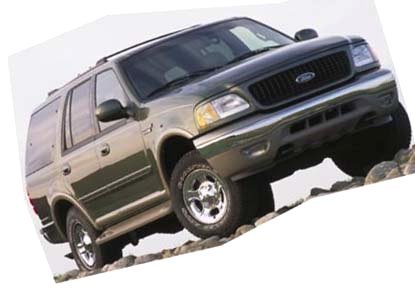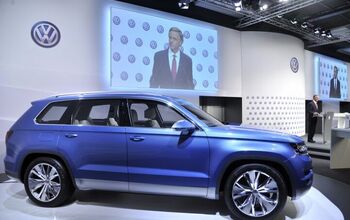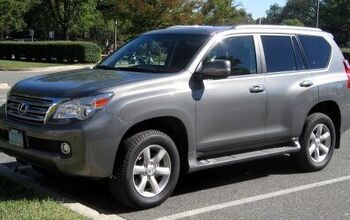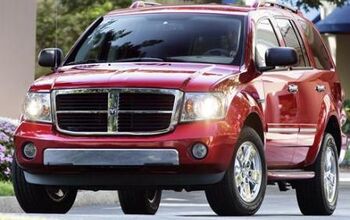USA SUV SVP
The SUV backlash starts here. So proclaims an American billboard advertising the new MINI. It's the company's low-cost attempt to entice Yanks out of cars so damn big they can strap a MINI into the rear seats and still have room for the in-laws. Sure the MINI is a great car. But if MINI's masters thinks their pocket rocket has what it takes to extract Americans from their beloved SUV's, I've got news: it ain't gonna happen.
Get real guys. If an SUV backlash will start anywhere, it will probably start in Iraq— if and when American military action provokes another oil crisis. Should the price of gas ascend like a cruise missile off a battleship, or availability falter like a British machine gun in the sands of Afghanistan, then and only then, will American consumers abandon their SUV's. Maybe.
It would take a major macroeconomic shock to sour America's love affair with the SUV. SUVs now account for over half of all new passenger vehicle sales in the US. Even a casual survey of a mall parking lot confirms the stats: small cars are literally lost in herds of Explorers, Expeditions, Avalanches, Navigators, Durangos and the like. Which is more than a little strange. The country with more paved roads than any other landmass on Earth has gone ape shit for vehicles designed to ford streams and climb mountains.
All of which raises an interesting question: why are SUV's so popular Americans will only surrender the keys when you prise them from their cold, dead fingers?
Pundits often claim that the SUV's elevated driving position is the key to their success. Specifically, they maintain that the extra ability to see what's ahead makes drivers—especially women—feel safer. Supposedly, this height also creates a sense of superiority (a feeling not unknown to pundits). While seeing is avoiding, and no one other than the husband of a supermodel would deny that height equals dominance, the SUV's core appeal lies elsewhere. It's a matter of size.
Soccer Moms and long haul truckers alike know the truth: there's something deeply, intrinsically satisfying about driving a vehicle big enough to straddle two states. Manoeuvring that much mass at even a walking pace gives SUV drivers a God-like feeling of power that Porsche drivers rarely experience away from a track. It's like steering from Daddy's lap, except better. Is that really so hard to understand? We admire a boat captain who can make a luxury liner kiss the dock, yet many are quick to deride drivers who can swing a Ford Explorer into a school parking lot without hitting a single child.
The SUV's other great advantage is, of course, space.
Americans are big. A recent study estimates that over 50% of Americans are clinically obese. You can take a moral position on that finding, but I wouldn't recommend taking it next to an average American sitting in the back of an average European runabout. Why not hop aboard a Cadillac Escalade, settle into your Club Class seat, pop open a cool drink from a nearby 'frig, adjust your personal climate control and discuss the subject in an environment more conducive to civilised (if strenuous) debate? In a nation where more people own guns than computers, any vehicle that can keep fat-saturated, sugar-crazed citizens calm and comfortable has got to be a good thing.
And don't forget the stuff. Americans don't. They use their SUVs to tow boats, jet skis, motorcycles, bicycles, cars, planes, horses and mobile homes. If Yanks abandoned their tanks, the US lifestyle and tourist industries would be in real danger of going belly up. Sure, you could use a "normal" car to haul all that clobber from here to there, but don't forget: "the pursuit of happiness" is enshrined in America's Declaration of Independence. The bigger the rig, the bigger the load. The more toys you can schlep, the greater the potential happiness. Simple.
Obviously, such common sense will have precious little impact on those who condemn SUVs. To be fair, there's a lot to hate about the breed. They guzzle gas like frat boys draining a keg of beer. They pour hydrocarbons into the atmosphere (although a single London bus emits more toxins than 50 SUVs). They're fully capable of squishing smaller vehicles like a bug. But environmentalism and safety consciousness are not enough to overcome the SUV's basic appeal. And as long as Americans live in a free society, they'll feel free to buy the vehicle that best suits their desire for fun and comfort.
Needless to say, BMW understands this. The same people who make the MINI are busy developing another model in their own SUV range. If you're the kind of person who takes a dim view of corporate hypocrisy, the MINI backlash starts here.
More by Robert Farago
Latest Car Reviews
Read moreLatest Product Reviews
Read moreRecent Comments
- Jkross22 Their bet to just buy an existing platform from GM rather than build it from the ground up seems like a smart move. Building an infrastructure for EVs at this point doesn't seem like a wise choice. Perhaps they'll slow walk the development hoping that the tides change over the next 5 years. They'll probably need a longer time horizon than that.
- Lou_BC Hard pass
- TheEndlessEnigma These cars were bought and hooned. This is a bomb waiting to go off in an owner's driveway.
- Kwik_Shift_Pro4X Thankfully I don't have to deal with GDI issues in my Frontier. These cleaners should do well for me if I win.
- Theflyersfan Serious answer time...Honda used to stand for excellence in auto engineering. Their first main claim to fame was the CVCC (we don't need a catalytic converter!) engine and it sent from there. Their suspensions, their VTEC engines, slick manual transmissions, even a stowing minivan seat, all theirs. But I think they've been coasting a bit lately. Yes, the Civic Type-R has a powerful small engine, but the Honda of old would have found a way to get more revs out of it and make it feel like an i-VTEC engine of old instead of any old turbo engine that can be found in a multitude of performance small cars. Their 1.5L turbo-4...well...have they ever figured out the oil dilution problems? Very un-Honda-like. Paint issues that still linger. Cheaper feeling interior trim. All things that fly in the face of what Honda once was. The only thing that they seem to have kept have been the sales staff that treat you with utter contempt for daring to walk into their inner sanctum and wanting a deal on something that isn't a bare-bones CR-V. So Honda, beat the rest of your Japanese and Korean rivals, and plug-in hybridize everything. If you want a relatively (in an engineering way) easy way to get ahead of the curve, raise the CAFE score, and have a major point to advertise, and be able to sell to those who can't plug in easily, sell them on something that will get, for example, 35% better mileage, plug in when you get a chance, and drives like a Honda. Bring back some of the engineering skills that Honda once stood for. And then start introducing a portfolio of EVs once people are more comfortable with the idea of plugging in. People seeing that they can easily use an EV for their daily errands with the gas engine never starting will eventually sell them on a future EV because that range anxiety will be lessened. The all EV leap is still a bridge too far, especially as recent sales numbers have shown. Baby steps. That's how you win people over.


































Comments
Join the conversation
"If an SUV backlash will start anywhere, it will probably start in Iraq— if and when American military action provokes another oil crisis." What a prophetic statement from 2002